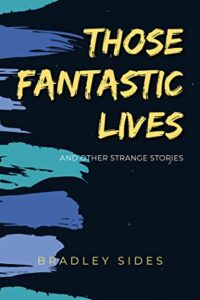Review by Sarah Appleton // January 18, 2018
Sarabande Books, 2017
ISBN: 978-1946448057
240 pp. / $15.95
Emily Fridlund has had an eventful year: her novel The History of Wolves was short-listed for the Man Booker Prize, and her short story collection, Catapult, won Sarabande Books’s Mary McCarthy Prize in Short Fiction, selected by Ben Marcus. Fridlund’s short stories are riveting; they tantalize in their description and submerge readers in the ominous, off-kilter world of her characters.
Fridlund entrances the reader right from the start of each story. “My wife could take your skin off with one glance, she was that excruciating,” begins the opening story, “Expecting.” This bluntness is characteristic of her narrators and their opening lines, and the underlying threat leaves little room to doubt that darkness will follow. These openings often skirt the plot’s central tension and speak instead to the narrator’s root of or excuse for their present situation, illuminating a quality of the character that tips toward deranged by the end of the story. “It wasn’t my husband that wanted the bear, it was me,” the narrator opens “Lake Arcturus Lodge,” a story about a couple starting a lodge and attempting to start a family too, although they are divided on this. In the titular story, the adolescent narrator says, “That summer I was reading vampire books, so when Noah said no to sex, I let myself pretend that’s what he was. I told myself: inside his mouth is a hallway to death.” Of course, the whole story, then, is about sex and not about sex, about a girl teetering on the cusp of not-quite-womanhood. As these opening lines demonstrate, the lines work to frame the character’s already off-kilter world, which tilts further as the plot progresses.
Perhaps the most unifying characteristic of the collection’s eleven stories are the fraught relationships between characters—husbands and wives, best friends, parents and children, those who are thrown together by circumstance, characters who are often waiting or stalled in a liminal space. In “Expecting,” the narrator thinks of his son’s pregnant girlfriend, “She looks devastated by her body. I tell her she looks nice because I’m afraid for her.” Later, when the baby is born, the characters are discomfited by her aloofness, her decidedly unbaby-like qualities. “She reminds me of my wife,” the narrator thinks, “and I pray that the baby will never learn to talk, never wobble onto her feet so she can walk away…We call her ‘the baby’ to her face to make ourselves feel better.” Before the baby, two females walked out of the narrator’s life, and this sense of isolation and being left behind pervades the collection. It recurs in “Here, Still.” The narrator thinks, “With most people in my life, I come to the end of myself pretty fast. I walk to my borders—where there’s dinner on a dropleaf table, maybe small talk or sex—then wave politely and turn back. [My best friend] made me sorry there wasn’t anywhere better to go.” This narrator, like others, is more than arm’s length from those around her, fundamentally incapable of forging a human connection with those she ought to be closest to, who love her most.
Characters also experience fraught relationships with their selves. “I was still holding out hope that my body could go back to being what it was a year ago, effortless and completely forgettable,” the narrator of the titular story says, “but that was starting to seem less and less likely.” Her thought belies her vulnerability, but smacks of Fridlund’s precise description, too, which enables readers to feel, like the narrator, the “effortless and completely forgettable” body she once had. In “Lake Arcturus Lodge,” a guest visiting the lodge gets drunk and tells the story about leaving his mother to die in an avalanche. “‘I just wanted to survive,’” he says, “‘but now I can’t do nothing. I’m a napkin. I’m rust.’” The guest’s description of himself moves from something disposable to something already decayed, a description which rings with exceptional eloquence.
Fridlund also stuns readers with the preciseness and concision of her characterization: “Her mother is in her fifties, widowed, loyal to horoscopes. She is afraid of making decisions that work against her fate,” from “Time Difference,” and “I thought of how Tom combed his hair before he came to bed, the way he once wore swimming goggles in a snowstorm,” in “Here, Still.” Fridlund wrenches readers most, however, with her salient descriptions of the human condition and the relationships we cultivate. “Childhood, by then, had been sucked dry by the unremitting soullessness of adolescence,” the newly-teenaged narrator laments in the titular story. In “Time Difference,” the narrator notes, “The problem with living with someone is that your every act can be transformed into another example of their larger theory of you,” a sentence which may well sum up the experiences and relationships of most of the collection’s narrators given their insularity.
One of the most striking pieces of the collection, “Gimme Shelter,” is distinctive because it’s composed of short vignettes that build a life, and ultimately disorient the reader as the narrator, Lynn, becomes increasingly unreliable. The story is anchored by the house she grew up in and the family it once contained. In the second vignette, Lynn recounts a dream in which the house has a 19th century library that her parents have hidden from her and her siblings. She professes to understand “that [her parents] were just a little cruel, to hide the best room in the house from their children.” Although her parents have done no such thing, the sentiment sticks despite the apparent normalcy of her childhood. From this moment, Lynn’s psychological state seems to slowly and subtly deteriorate. In the end, Fridlund circles back to the structure of a house. Lynn, reminiscing with her siblings at her father’s funeral, reflects on the game of their mother’s invention they played as children: “it seemed possible to Lynn for a brief instant that no other reality had in fact ever fully existed for any of them, that there had only ever been that old car on the highway with all of them inside, each locked in their chosen rooms, and she wondered in anguish and awe how many times she would forget and have to remember this again.” Lynn reveals how isolated she’s felt all along, thereby becoming another of Fridlund’s isolated narrators despite their proximity to people who love them.
In short, Fridlund’s collection is a riveting read, and the blow of one last line leads to the scintillating opening sentence of the following story. At times, Fridlund may push her original detail a little too far, distracting readers from the central tensions of a scene rather than enriching them. This, however, is not the norm; on the whole, the collection is so enthralling that it can be read in one go, but its stories are so devastating that one yearns to read them repeatedly. “It’s all too staged, too obvious to talk about,” the frustrated narrator of “Lock Jaw” thinks. Like the narrator’s situation, these stories are conspicuously staged, set against desolate, decrepit backdrops, peopled with isolated, off-kilter characters. And yet, these stories are far from being too obvious to talk about. They are exactly what we should be saying.
ABOUT THE REVIEWER
Sarah Appleton earned her MFA in creative nonfiction at Western Washington University. Her writing projects focus on memory, family, and feminism. She currently teaches at Cranbrook Kingswood School where she lives with her fiancé and beautiful Australian Shepherd, Zoë. You can find her@sarahkapples on Twitter.






